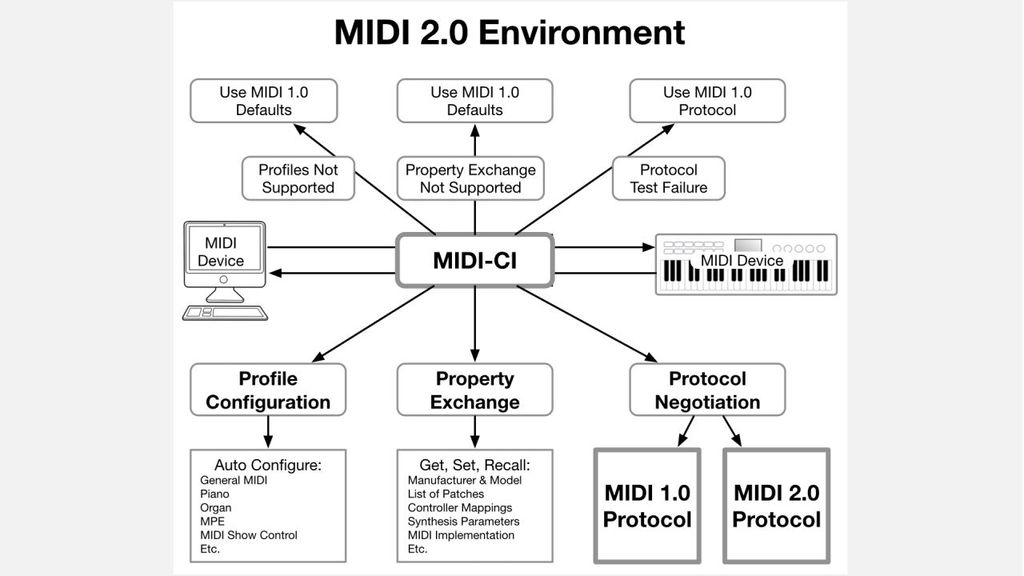- in Production by Bobby Owsinski
MIDI 2.0 Is Almost Here

MIDI changed music creation in so many ways when it was introduced, but you hear less about it these days thanks to virtual instruments and so much music making in the box. That said, it’s still a very important tool, especially if you want your DAW to talk to outside instruments. Even though MIDI might seem to be a little long in the tooth, the MIDI Manufacturers Association (MMA) has not stood still on updating the spec, as the latest MIDI 2.0 was recently announced.
MIDI changed music creation in so many ways when it was introduced, but you hear less about it these days thanks to virtual instruments and so much music making in the box. That said, it’s still a very important tool, especially if you want your DAW to talk to outside instruments. Even though MIDI might seem to be a little long in the tooth, the MIDI Manufacturers Association (MMA) has not stood still on updating the spec, as the latest MIDI 2.0 was recently announced.
The whole idea was to update MIDI to better integrate to the technology commonly used around it these days, while adding some much requested features at the same time. Plus, it still has to remain backwards compatible with previous MIDI spec.
The new spec is currently in it’s prototyping stage and probably won’t be officially launched until later in the year. In the meantime, participating companies like Ableton/Cycling ’74, Art+Logic, Bome Software, Google, imitone, Native Instruments, Roland, ROLI, Steinberg, TouchKeys, and Yamaha all showed products featuring the MIDI 2.0 prototype spec.
The MIDI 2.0 initiative updates MIDI with auto-configuration, new DAW/web integrations, extended resolution, increased expressiveness, and tighter timing, all while maintaining a high priority on backward compatibility. This major update of MIDI paves the way for a new generation of advanced interconnected MIDI devices, while still preserving interoperability with the millions of existing MIDI 1.0 devices. One of the core goals of the MIDI 2.0 initiative is to also enhance the MIDI 1.0 feature set whenever possible.
If you’re a MIDI user this is pretty exciting, since the spec has been fairly dormant for a long time and power users have been requesting a lot of features that would make MIDI integrate better into today’s digital workflow. Now it looks like those requests have finally been answered.
If you’re interested in finding out more about MIDI 2.0, there probably more info than you want to know here.
Sorry, but comments have been disabled due to the enormous amount of spam received. Please leave a comment on the social media post related to this topic instead.
The whole idea was to update MIDI to better integrate to the technology commonly used around it these days, while adding some much requested features at the same time. Plus, it still has to remain backwards compatible with previous MIDI spec.
The new spec is currently in it’s prototyping stage and probably won’t be officially launched until later in the year. In the meantime, participating companies like Ableton/Cycling ’74, Art+Logic, Bome Software, Google, imitone, Native Instruments, Roland, ROLI, Steinberg, TouchKeys, and Yamaha all showed products featuring the MIDI 2.0 prototype spec.
The MIDI 2.0 initiative updates MIDI with auto-configuration, new DAW/web integrations, extended resolution, increased expressiveness, and tighter timing, all while maintaining a high priority on backward compatibility. This major update of MIDI paves the way for a new generation of advanced interconnected MIDI devices, while still preserving interoperability with the millions of existing MIDI 1.0 devices. One of the core goals of the MIDI 2.0 initiative is to also enhance the MIDI 1.0 feature set whenever possible.
If you’re a MIDI user this is pretty exciting, since the spec has been fairly dormant for a long time and power users have been requesting a lot of features that would make MIDI integrate better into today’s digital workflow. Now it looks like those requests have finally been answered.
If you’re interested in finding out more about MIDI 2.0, there probably more info than you want to know here.
Sorry, but comments have been disabled due to the enormous amount of spam received. Please leave a comment on the social media post related to this topic instead.

